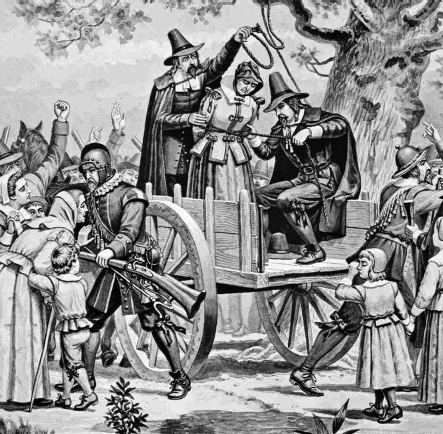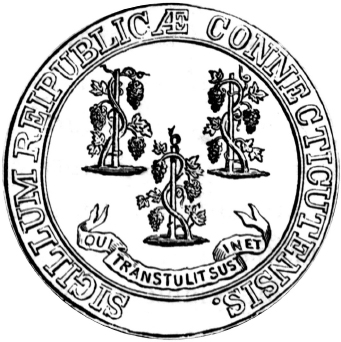
AFTERWORD
Descendants Petition for Posthumous Pardons
WHEREAS, in colonial Connecticut, various men and women were accused by their neighbors and townsfolk of practicing witchcraft; and…
WHEREAS, such accusations were sometimes made because a person was associated with the sudden and unexplained illness of another person, or predicted the illness or recovery from illness of another person, or had knowledge of past or future events; and
WHEREAS, such accusations were sometimes made simply because a person habitually muttered to himself or herself, or talked to unseen persons, or used vulgar language, or gave evil looks, or was a notorious liar, or was a nonconformist, or caused discord among his or her neighbors; and
WHEREAS, some of the accused persons were indicted and put on trial for practicing witchcraft; and
WHEREAS, these trials were conducted without the evidentiary procedures and safeguards that are standard in Connecticut’s criminal justice system today; and
WHEREAS, some of the accused persons were found guilty of practicing witchcraft and sentenced to death by hanging.
NOW, THEREFORE, BE IT RESOLVED, that although the facts of the accusations, prosecutions, trials and executions of persons practicing witchcraft in colonial Connecticut cannot be undone or changed, the General Assembly declares its belief that such proceedings, even if lawful under the existing law of the Colony of Connecticut, were shocking, and the result of community-wide hysteria and fear, and that no disgrace or cause for distress should attach to the descendants of these accused and convicted persons…
Almost four centuries after the first person in Connecticut was executed for witchcraft, descendants of the eleven sentenced to death lobbied the state General Assembly to pass a joint resolution condemning the trials and exonerating those convicted, even though the acts were lawful at the time they took place. The 2008 legislation was introduced by State Senator Andrew Roraback of Goshen at the request of mother and daughter Debra and Addie Avery, whose great-great-great-great-great-great-great-great-grandmother (one more great for Addie) was Mary Stanford of Hartford, convicted and hanged in 1662.
“Mary Stanford is our grandmother. It doesn’t matter if she’s eight generations back,” Debra told the Hartford Courant.
Mary’s husband, Andrew, also charged, was set free when the jury couldn’t reach a verdict. But Mary went to the gallows. The few court records that survive show that at the time of Mary’s death, they were the parents of four or five children, the oldest at least sixteen years old and the youngest six.
Charges against Mary were “familiarity with Satan” and having “acted and also come to the knowledge of secrets in a preternatural way beyond the course of nature to the great disturbance of several members of this Commonwealth.”
At the trial of fellow Hartford resident Rebecca Greensmith the following year, Rebecca would also name Mary as one of several witches who met in the woods for diabolical bacchanals. Rebecca was also hanged. Debra Avery spoke out on behalf of Mary, Andrew and the other accused at the March 2008 legislative hearing for the bill:
Why exonerate our citizens wrongly accused so many years ago? Though the governing body of colonial times in Connecticut believed they were protecting their community members by prosecuting those suspected of practicing witchcraft, today we recognize that those convictions were unfounded and acknowledgement of their innocence through a formal resolution will serve to correct the official record, as well as educate the public on the dangers of judicial scapegoating. Mob rule has left its ugly mark many times during social unrest in America, from colonial witch hunts to the lynchings in the segregated south. The term witch hunt is still used today when we perceive an unjust search for the truth.

“I am no witch. I am innocent. I know nothing of it,” said Bridget Bishop, the first person executed for witchcraft in Salem, before she was hanged. No known record exists of the last words of Alse Youngs, who fifty years earlier in Hartford was the first person to be executed for witchcraft in New England.
Other descendants expressed similar sentiments, including Patricia Borris, whose great-great-great-great-great-great-great-great-great-great-grandparents Joan and John Carrington of Wethersfield were both indicted for “familiarity with Satan” and “works above the course of nature” and hanged in 1651. Aside from records that show the Carringtons’ estate was worth no more than twenty-four pounds, these meager facts are all that’s known about the couple. Equally slim, but powerful, were the words Borris said to legislators considering the exoneration resolution: “It is never too late to right a wrong.”
At the time, many legislators touted the exoneration measure, including state representative Michael Lawlor of East Haven, who, during the committee hearing, told descendants: “This is really a fascinating story and a piece of Connecticut’s history—a shameful piece. As much as this is about clearing the names of your families, it’s really clearing the name of our state and its history, and acknowledging that what happened was such a tragedy and an outrage.” Unfortunately, to the dismay of those who worked so hard for it, Senate Joint Resolution No. 26 never made it out of the Judiciary Committee. Legislators failed to vote on it before the session ended, and efforts to revive it in 2009 failed.
Other states, however, have made restitutions for witch convictions, even if just symbolic ones. In 1957 and 2001, Massachusetts issued pardons for several of those convicted in the Salem trials. The actions were follow-ups to a decision in 1711 to exonerate all those accused and offer compensation to their relatives for the unlawful ways confessions and testimonies were obtained.
In 1711, just nineteen years after the Salem hysteria, only a handful of families came forward to accept the apology. Shame and mistruths about the accused villagers still existed, as did relatives’ fears about admitting their connection to an accused or convicted witch. By the late twentieth and early twenty-first centuries, this mindset had thankfully changed, and several Massachusetts descendants came forward, asking that pardons and apologies be offered again.
Legislators in Virginia and New Hampshire have also provided exonerations for seventeenth-century residents accused and executed for witchcraft in those colonies. But if past results are any indication, the apologies and “justice” Connecticut witch trials descendants want for their ancestors may not arrive.
Requests to Connecticut’s Board of Pardons and Paroles have been denied, its bylaws stating it does not grant posthumous pardons. Additionally, today’s state government has no jurisdiction over colonial Connecticut, officials said. In response to this, one descendant wrote a letter to England’s Queen Elizabeth II, hoping that because colonial Connecticut was under English rule during its witch trials, she or Parliament would grant posthumous pardons. But that request was also denied.
Revitalized efforts in 2012 led to descendants asking Connecticut governor Dannel P. Malloy to issue not a pardon but a proclamation that would clear their relatives’ names and condemn the prosecutions and killings. Similar to earlier requests, Malloy said he did not have the authority or feel it was right to censure another government, in another time—something state historian Walter Woodward believes is right. “It’s hard to live in one time period, which has its own cultural mores, its own sense of right and wrong, and make effective judgments about another time period,” Woodward said in a 2012 Religion News Service article that appeared on the Huffington Post website.

One of the Connecticut Colony’s seals. It’s believed that the three grapevines represent the colony’s first three communities, where the earliest witch accusations occurred. The Latin “Qui Transtulit Sustinet” translates into “he who is transplanted sustains” and is still the state’s motto today.
From today’s perspective, Connecticut’s witchcraft trials were an obvious injustice. But as discussed in Chapter 7, past events can’t be interpreted through contemporary attitudes. “Once you start crossing the border,” Woodward added, “you forget that the past is a foreign country. It’s a slippery slope.”